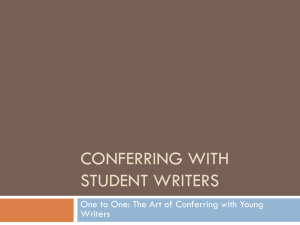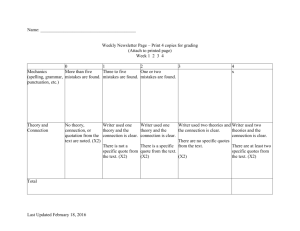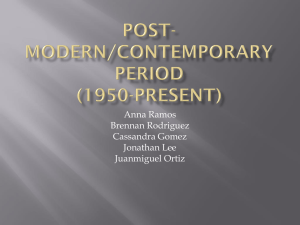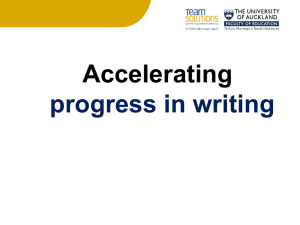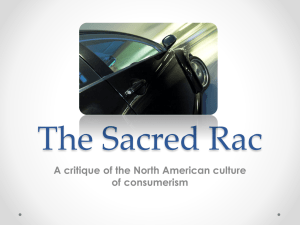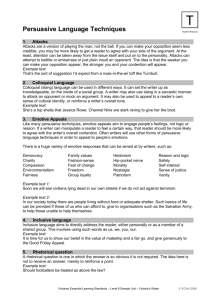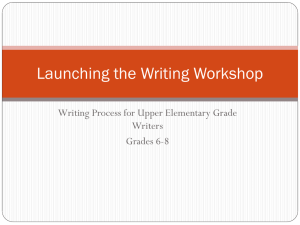Paper number 1 27KB Feb 04 2013 10:25:44 PM
advertisement
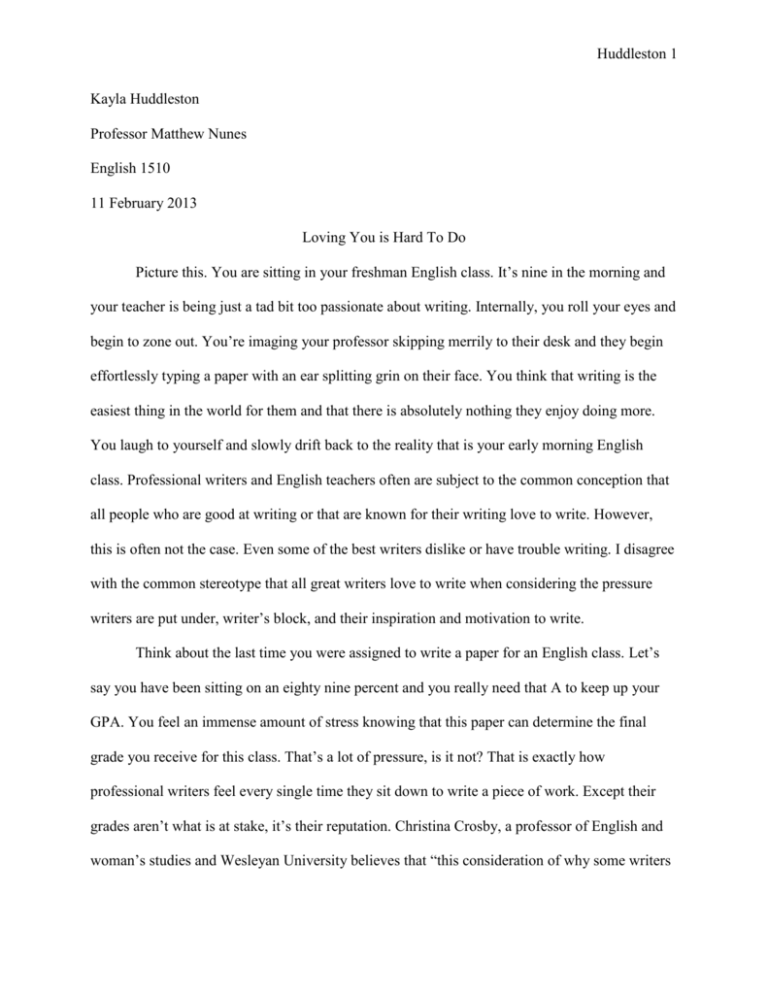
Huddleston 1 Kayla Huddleston Professor Matthew Nunes English 1510 11 February 2013 Loving You is Hard To Do Picture this. You are sitting in your freshman English class. It’s nine in the morning and your teacher is being just a tad bit too passionate about writing. Internally, you roll your eyes and begin to zone out. You’re imaging your professor skipping merrily to their desk and they begin effortlessly typing a paper with an ear splitting grin on their face. You think that writing is the easiest thing in the world for them and that there is absolutely nothing they enjoy doing more. You laugh to yourself and slowly drift back to the reality that is your early morning English class. Professional writers and English teachers often are subject to the common conception that all people who are good at writing or that are known for their writing love to write. However, this is often not the case. Even some of the best writers dislike or have trouble writing. I disagree with the common stereotype that all great writers love to write when considering the pressure writers are put under, writer’s block, and their inspiration and motivation to write. Think about the last time you were assigned to write a paper for an English class. Let’s say you have been sitting on an eighty nine percent and you really need that A to keep up your GPA. You feel an immense amount of stress knowing that this paper can determine the final grade you receive for this class. That’s a lot of pressure, is it not? That is exactly how professional writers feel every single time they sit down to write a piece of work. Except their grades aren’t what is at stake, it’s their reputation. Christina Crosby, a professor of English and woman’s studies and Wesleyan University believes that “this consideration of why some writers Huddleston 2 have difficulty writing tells us something about the conditions under which all [writers] labor.” (628). Crosby makes a valid point because every time an author sends out a paper or article to be published in a newspaper, magazine, or even textbook, they risk the possibility that the audience could absolutely hate it. If the public dislikes their piece then their reputation could greatly be dismissed. Have you ever sat down to write a paper and did nothing but sat and stared at a blank screen for what felt like hours? You sit and rack your brains and just cannot figure out what exactly it is you need or want to write. Even the greatest authors have suffered from severe writer’s block. Writer’s block is defined as “a usually temporary condition in which a writer finds it impossible to proceed with the writing of a novel, play, or other work” (look up how to cite a webpage). Nowhere in this definition does it say that professionals are exempt from this condition. Let’s compare it to playing baseball. Remember in third grade when you made that error and dropped that ball when the third baseball threw it to you at home? You had an off game. Remember that error Matt Holliday made in the 2009 National League Division Series? James Loney hits the ball right to Holliday and it misses his glove and bounces to the ground. Holliday made a mistake; he had an off game, just like you did in that little league game in third grade. Whether it be Shakespeare or eighteen year old you, we are all just humans and can experience the same struggles while attempting to write. Sarah Allen, a literature teacher and literary scholar herself, once recalled that even “Peter Elbow—the guy who put free-writing on the map, wrote one of the first book-length studies of the writing process, and has been the virtual MLK, Jr. for voice-in-writing (yeah, that guy)—dropped out of graduate school because he suffered so badly from writer’s block.” (36). Elbow made some very important milestones in the writing world and even he struggled so much with writer’s block that he quit graduate school. Huddleston 3 Even though he was a famous writer he was faced with the same struggles that we as college students are sometimes faced with while writing papers for our classes. It’s eleven at night and you have yet to find motivation to start that paper that is due for your English class the next day. You sit there with your laptop open but you just cannot make yourself open up that dreaded word document labeled English Paper 1. Well known writers sometimes lack motivation exactly like you do trying to writer that English paper that’s due the next day. Many great writers often lose motivation to write because they simply have nothing new to write about; they lack inspiration. Edgar Allan Poe suffered a very tragic life, losing his wife and mother to disease and struggling with his addiction to alcohol. *FIND EDGAR ALLAN POE QUOTE* Many people recognize Poe’s works for being very grotesque and dark. Even though his work is so eerie and chilling it is still very well known for that reason. Poe may not have had the inspiration and motivation to write most of his pieces if he had not had such a hard life. Inspiration and motivation go hand in hand. If the author has nothing to inspire them, they will have no kind of motivation to write. When a writer experiences things such as pressure to write a fantastic piece, suffering from a terrible episode of writer’s block, and lack of motivation and inspiration, they find it hard to look forward to write. Even though they are fantastic at what they do does not always mean they love doing. Let’s say your passion is playing football. I’m sure you have moments when you really just do not feel like going to practice that day. Writers are the same. Just because they are good at writing, does not always mean they are excited to sit down at a desk to write a new piece. So next time you are sitting there in your freshman English class at nine in the morning smirking at your English teacher for being just a bit too passionate about writing, remember that Huddleston 4 they are a normal person just like you. Just because they are a fantastic writer does not mean that they always love writing. Huddleston 5 Works Cited Allen, Sarah. "The Inspired Writer Vs. the Real Writer."Library of Congress Cataloging-in Publication Data. 1. (2010): n. page. Web. 4 Feb. 2013. Crosby, Christina. "Writer's Block, Merit, and the Market: Working in the University of Excellence." National Council of Teachers of English. 65.6 (2003): 626-645. Web. 4 Feb. 2013.

